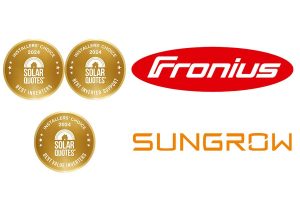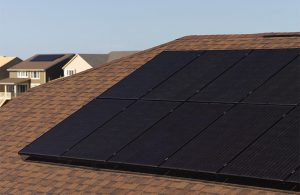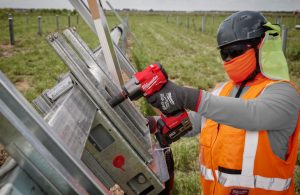Auxin sues Commerce, CBP over Biden’s pause in AD/CVD collection on solar imports
Just before the end of 2023, Auxin Solar filed a lawsuit in the U.S. Court of International Trade (CIT) against the U.S. Dept. of Commerce and Customs and Border Protection (CBP) for not collecting fees and credits based on the affirmative anti-dumping/countervailing duties (AD/CVD) ruling on solar imports from Southeast Asia using Chinese components.

Credit: EightTwenty
Even though President Joe Biden issued an executive order in June 2022 to pause for two years any retroactive or new duties being placed on solar cells and panels coming from Cambodia, Malaysia, Thailand and Vietnam that use Chinese components, Auxin said that the Dept. of Commerce is not required to follow that order.
Commerce published procedures in September 2022, a document that Auxin repeatedly refers to as the “Final Solar Duty Holiday Rule,” as a way to implement Biden’s proclamation. Commerce ruled that it would prevent the liquidation, application of AD/CVD and collection of cash deposits on Southeast Asian solar imports through June 6, 2024.
Auxin said this new ruling is unlawful based on Commerce’s scope and wants CIT to rule this pause as “an abuse of discretion” and throw it out.
Solar AD/CVD background
AD/CVD have been in place against Chinese solar imports since 2012. A group of anonymous solar panel manufacturers first asked Commerce in 2021 to look at specific Chinese solar panel manufacturers working in Southeast Asia as a way to circumvent AD/CVD requirements and unfairly price their products to undercut American manufacturers. Commerce rejected that petition because of the anonymous nature of the petitioners, and so California-based solar panel assembler Auxin Solar put its name on a new petition in 2022. Commerce decided to investigate the situation.
At the time of the investigation, solar panels from Cambodia, Malaysia, Thailand and Vietnam made up 80% of supply in the United States, and exporters stopped bringing in more panels for fear of high retroactive duties. The utility-scale market ground to a halt. President Biden stepped in with the two-year pause on any additional tariffs in June 2022 to “ensure the U.S. has access to a sufficient supply of solar modules to meet electricity generation needs while domestic manufacturing scales up.” The Dept. of Commerce then issued its new rule conforming to Biden’s order in September.
In December 2022, Commerce preliminarily decided that Chinese solar cell and panel producers were working in the four Southeast Asian countries as a way to avoid paying duties on Chinese-made solar goods. The final decision in August 2023 closely followed the preliminary determination: AD/CVD rates would be extended to solar exports coming out of Southeast Asia, except for a few exemptions. Any imported silicon cells using Chinese wafers, or silicon panels using Chinese wafers and three other Chinese-made materials would be under AD/CVD once the June 6, 2024, suspension was lifted.
The latest legal development
Auxin Solar filed the lawsuit against Commerce and CBP on Dec, 29, 2023. Auxin is joined on the plaintiff side by Concept Clean Energy (CCE), a small designer of “solar structures” based in Southern California. The pair said they have standing to sue because each is “adversely affected or aggrieved by agency action.” Auxin Solar still cannot make solar cells and panels that can compete with cheap imports from China and Southeast Asia, and CCE can’t make solar structures that meet domestic content guidelines if cheaper imports are preventing domestic manufacturers from making product.
The plaintiffs reiterated that they do not disagree with AD/CVD being imposed on Southeast Asian imports, just that the pause in duty collection has happened and is still ongoing.
“By unlawfully denying Solar Plaintiffs [Auxin and CCE] the protection from unfairly dumped and subsidized imports that Solar Plaintiffs are due under the Tariff Act of 1930, as amended, Commerce’s Final Solar Duty Holiday Rule has precipitated a lawless [crystalline silicon] cell and module marketplace characterized by a massive and sustained wave of cheap [crystalline silicon] cells and modules from Malaysia, Thailand, Vietnam and Cambodia that are made from components originating in the People’s Republic of China,” the lawsuit said.
Auxin said Commerce is bound by law to direct CBP to suspend the liquidation and require a cash deposit of estimated duties for each import as soon as an affirmative AD/CVD is determined. Commerce was not “practically nor legally required to promulgate new regulations” to take action in response to Biden’s executive order. Rather than follow its own regulations, Auxin said, Commerce instead “persisted in its unlawful reliance on the Final Solar Duty Holiday Rule to eliminate suspension of liquidation and cash deposit obligations with respect to” imports from Southeast Asia.
This pause in AD/CVD collection has deprived Auxin from its right to relief from the cheaper, dumped products, the company said.
“Given that Commerce has found circumvention to be ongoing, the Final Solar Duty Holiday Rule creates a strong incentive — sanctioned duty avoidance — for Chinese firms to ship as many circumventing panels as possible, at least until the expiration of the declared ‘emergency.’ Thus, in a very real sense, Solar Plaintiffs are presently worse off than if Commerce had never undertaken circumvention inquiries,” Auxin said.
The U.S. solar manufacturing market
The United States is in the process of increasing its domestic solar panel manufacturing capacity. More than 20 new panel assembly facilities are in the process of being built, many with capacities in the multi-gigawatt range. Only 3.5 GW of solar cells were imported in 2023 though, which suggests that the 10 or so functioning domestic silicon panel manufacturers are operating at small capacities. The country is still very much dependent on imported solar panels to meet installation demand.
Auxin Solar currently operates a 150-MW factory in San Jose, California, and the company said it has invested in new equipment and is producing modules using larger M10 wafers.
Solar Power World will continue to follow this solar tariff development. Read more on our tariff coverage here and find the latest on domestic manufacturing here.





